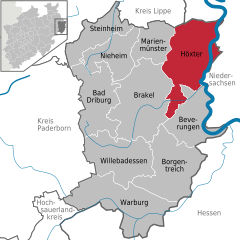Lüchtringen
| Höxter | ||
|---|---|---|

Town hall
|
||
|
||
| Coordinates: 51°46′N 9°22′E / 51.767°N 9.367°ECoordinates: 51°46′N 9°22′E / 51.767°N 9.367°E | ||
| Country | Germany | |
| State | North Rhine-Westphalia | |
| Admin. region | Detmold | |
| District | Höxter | |
| Government | ||
| • Mayor | Alexander Fischer (SPD) | |
| Area | ||
| • Total | 157.89 km2 (60.96 sq mi) | |
| Population (2015-12-31) | ||
| • Total | 29,589 | |
| • Density | 190/km2 (490/sq mi) | |
| Time zone | CET/CEST (UTC+1/+2) | |
| Postal codes | 37651–37671 | |
| Dialling codes | 05271, 05531, 05275, 05277, 05278 | |
| Vehicle registration | HX | |
| Website | www.hoexter.de | |
Höxter (German pronunciation: [ˈhœkstɐ]) is a town in eastern North Rhine-Westphalia, Germany on the left bank of the river Weser, 52 km north of Kassel in the centre of the Weser Uplands. The main town's population is around 15,000, and with outlying centres, about 30,000. It is the seat of the Höxter district.
As part of North Rhine-Westphalia's municipal reforms, the collective municipality of Höxter came into being on 1 January 1970, formed out of the eleven communities of the former Amt of Höxter-Land, the main town, and the community of Bruchhausen from the former Amt of Beverungen. The communities in question voluntarily merged to pool their resources and bring about a unified administration. These constituent communities are:
Höxter (Latin Huxaria) in the time of Charlemagne was a villa regia, and was the scene of a battle between his forces and the Saxons. Under the protection of the Abbey of Corvey it gradually increased in prosperity, and became the chief town of the principality of Corvey. Later it asserted its independence and joined the Hanseatic League.
Höxter was located on the important long distance trade-route known as Hellweg. Rivalry with Corvey Abbey and the nearby town known as Corvey increased and in 1265, the burghers of Höxter allied themselves with the Bishop of Paderborn. Their troops destroyed the town of Corvey and damaged the abbey. The town never recovered and over the following decades reverted to a small village. This event also marked the beginning of the long period of decline of the abbey.
Höxter suffered severely during the Thirty Years' War. In 1634, Imperial troops laid siege to the town in what became known as the Blutbad von Höxter (massacre of Höxter).
...
Wikipedia




